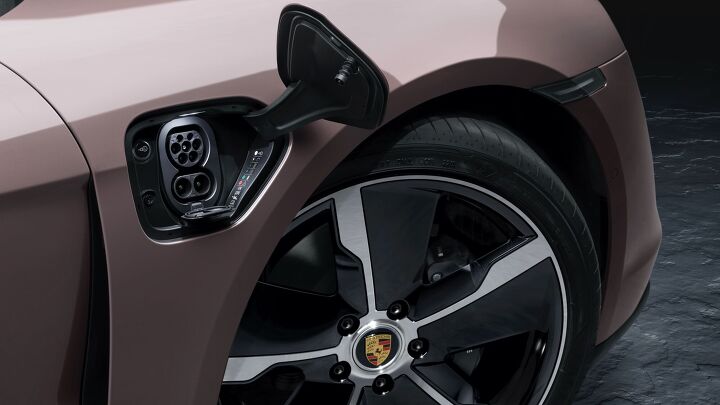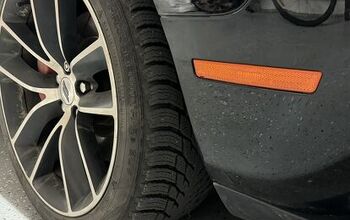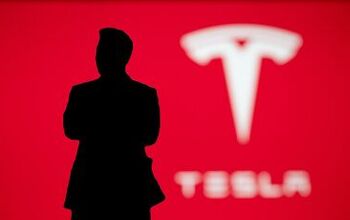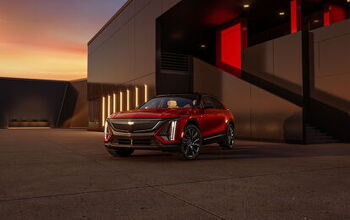Porsche Casts Doubt Upon Combustion Ban Timeline

While we’re constantly hearing about tightening emissions regulations, the relevant timelines issued by government actors are rarely adhered to. Electric vehicle subsidies went from temporary to indefinite and combustion bans have gone from right around the corner to anyone’s guess. This is also true of the industry itself, which often makes bold promises designed to appease a subset of the public only to repeatedly move the target date back a few years.
With this in mind, Porsche’s CFO was recently quoted as saying European combustion bans will probably need to be delayed and there’s good reason to believe him.
As things currently stand, the European Union has plotted banning the sale of new combustion-engine cars by 2030. However, Porsche Chief Financial Officer Lutz Meschke was quoted by Automotive News on Thursday casting some doubts.
"There's a lot of discussions right now around the end of the combustion engine," Meschke said in Singapore. "I think it could be delayed."
Despite Europe having adopted battery electric vehicles far more quickly than North America, the market is still confronting a lot of the same problems. In 2022, the EU estimated that 21.6-percent of all new car registrations were electric vehicles. That number was presumed to be around 5.9 percent in the United States, according to data accumulated from Kelly Blue Book.
While the EU does tend to lump plug-in hybrids into EV sales tabulations, the region is still outpacing the United States and Canada in terms of both PHEV and BEV volumes. But we continue to see similar complaints about public charging sites, fumbled vehicle launches, and have witnessed global electric sales begin to plateau by summer of 2023. Manufacturers have also signaled they’ll need more time to finish constructing EV facilities and started grumbling about subsidies being cut off.
It appears that European electrification efforts are confronting the same issues faced everywhere — leading to predictable results. UK Prime Minister Rishi Sunak announced the country would be pushing back a national combustion ban until 2035 last September and everyone is wondering if the European Commission will follow suit.
From Automotive News Europe:
A slowdown in EV orders has thrown into question whether the European Union is on track for the phaseout, which represents one of the most ambitious efforts to curb carbon emissions.
The region's consumers have been put off by a lack of reliable charging networks, persistently high prices and the rollback of EV incentives. The U.K. has already postponed its planned ban of new gasoline and diesel models by five years to 2035.
While manufacturers of premium and luxury EVs can work without subsidies, cutting them from the volume segment is wrong, said Meschke, who spoke on the sidelines of the unveiling of Porsche's long-delayed electric Macan SUV.
"We have to see how steep the ramp-up curve is in coming years," Meschke said. "If we have a situation like now, with certain reluctance to buy electric cars in Europe, then maybe the subsidies will come back."
Your author has repeatedly suggested ending electric vehicle subsidies, so it’s impossible to provide an unbiased take on the value of EV subsidies. The issue has also become stupidly divided along political lines, ensuring that hoards of people will cheer for opposing outcomes without giving it much thought. But it’s undeniable that the automotive sector is highly influential thanks to aggressive lobbying efforts and grossly overestimated its abilities to transition toward all electric vehicles.
Some have even alleged that the industry has intentionally sabotaged electric vehicles to use them as a scapegoat for controversial technologies companies wanted to pioneer before moving them into mainstream combustion models. That perhaps requires too much creative thinking to be seriously entertained without hard evidence. Botched product launches can be attributed to a generalized downturn in quality control and an over-reliance on software. Loathed public charging stations (Tesla Superchargers excluded) may also just be the result of the involved companies underestimating the level of maintenance required.
But the above doesn’t preclude automakers from wanting to take advantage of government money. As part of Volkswagen Group, Porsche is technically supposed to be committed toward transitioning its fleet to all-electric vehicles. However, the company is also trying to pioneer synthetic fuels (often called “e-fuels”) it has framed to the public as environmentally sound. Germany even found itself at odds with the European Commission after the latter decided against categorizing vehicles using synthetic fuel to fall outside prospective combustion bans. The reasoning behind this looks to be purely economical, as Germany sees e-fuels as a burgeoning industry with serious potential that it also just happens to be leading.
The largest piece of the puzzle is likely public opinion, however. Despite years of the industry trying to assure drivers that EV costs would be even to combustion vehicles by 2025, we’re not even close to that becoming a reality. Electric automobiles tend to be purchased by wealthier individuals as a secondary vehicle and (with notable exceptions) trade at much higher prices. They also depreciate more quickly, making them less attractive to the kind of people that care about resale values.
These factors have joined together with evaporating incentives to paint kind of a bleak picture for mainstream electrification. EV volumes remain slanted toward the luxury market at a time when the average person's purchasing power has declined, leaving the truly economical models to compete directly with gasoline-reliant alternatives boasting lower price tags. Assuming EVs offered a superior experience across the board, this wouldn’t be an issue. But electric cars tend to thrive under specific use cases, whereas combustion vehicles tend to be versatile and already have an established infrastructure to support them.
Now we're seeing automakers and governments that have been blindly championing the creation of "ultra-low emissions zones," and endorsing a forced pivot toward all-electric vehicles, openly questioning the feasibility of the very thing they've been fighting for since the early 2000s. We should probably take Porsche’s comments seriously.
[Image: Porsche]
Become a TTAC insider. Get the latest news, features, TTAC takes, and everything else that gets to the truth about cars first by subscribing to our newsletter.

A staunch consumer advocate tracking industry trends and regulation. Before joining TTAC, Matt spent a decade working for marketing and research firms based in NYC. Clients included several of the world’s largest automakers, global tire brands, and aftermarket part suppliers. Dissatisfied with the corporate world and resentful of having to wear suits everyday, he pivoted to writing about cars. Since then, that man has become an ardent supporter of the right-to-repair movement, been interviewed on the auto industry by national radio broadcasts, driven more rental cars than anyone ever should, participated in amateur rallying events, and received the requisite minimum training as sanctioned by the SCCA. Handy with a wrench, Matt grew up surrounded by Detroit auto workers and managed to get a pizza delivery job before he was legally eligible. He later found himself driving box trucks through Manhattan, guaranteeing future sympathy for actual truckers. He continues to conduct research pertaining to the automotive sector as an independent contractor and has since moved back to his native Michigan, closer to where the cars are born. A contrarian, Matt claims to prefer understeer — stating that front and all-wheel drive vehicles cater best to his driving style.
More by Matt Posky
Latest Car Reviews
Read moreLatest Product Reviews
Read moreRecent Comments
- Bd2 Lexus is just a higher trim package Toyota. ^^
- Tassos ONLY consider CIvics or Corollas, in their segment. NO DAMNED Hyundais, Kias, Nissans or esp Mitsus. Not even a Pretend-BMW Mazda. They may look cute but they SUCK.I always recommend Corollas to friends of mine who are not auto enthusiasts, even tho I never owed one, and owned a Civic Hatch 5 speed 1992 for 25 years. MANY follow my advice and are VERY happy. ALmost all are women.friends who believe they are auto enthusiasts would not listen to me anyway, and would never buy a Toyota. They are damned fools, on both counts.
- Tassos since Oct 2016 I drive a 2007 E320 Bluetec and since April 2017 also a 2008 E320 Bluetec.Now I am in my summer palace deep in the Eurozone until end October and drive the 2008.Changing the considerable oils (10 quarts synthetic) twice cost me 80 and 70 euros. Same changes in the US on the 2007 cost me $219 at the dealers and $120 at Firestone.Changing the air filter cost 30 Euros, with labor, and there are two such filters (engine and cabin), and changing the fuel filter only 50 euros, while in the US they asked for... $400. You can safely bet I declined and told them what to do with their gold-plated filter. And when I changed it in Europe, I looked at the old one and it was clean as a whistle.A set of Continentals tires, installed etc, 300 EurosI can't remember anything else for the 2008. For the 2007, a brand new set of manual rec'd tires at Discount Tire with free rotations for life used up the $500 allowance the dealer gave me when I bought it (tires only had 5000 miles left on them then)So, as you can see, I spent less than even if I owned a Lexus instead, and probably less than all these poor devils here that brag about their alleged low cost Datsun-Mitsus and Hyundai-Kias.And that's THETRUTHABOUTCARS. My Cars,
- NJRide These are the Q1 Luxury division salesAudi 44,226Acura 30,373BMW 84,475Genesis 14,777Mercedes 66,000Lexus 78,471Infiniti 13,904Volvo 30,000*Tesla (maybe not luxury but relevant): 125,000?Lincoln 24,894Cadillac 35,451So Cadillac is now stuck as a second-tier player with names like Volvo. Even German 3rd wheel Audi is outselling them. Where to gain sales?Surprisingly a decline of Tesla could boost Cadillac EVs. Tesla sort of is now in the old Buick-Mercury upper middle of the market. If lets say the market stays the same, but another 15-20% leave Tesla I could see some going for a Caddy EV or hybrid, but is the division ready to meet them?In terms of the mainstream luxury brands, Lexus is probably a better benchmark than BMW. Lexus is basically doing a modern interpretation of what Cadillac/upscale Olds/Buick used to completely dominate. But Lexus' only downfall is the lack of emotion, something Cadillac at least used to be good at. The Escalade still has far more styling and brand ID than most of Lexus. So match Lexus' quality but out-do them on comfort and styling. Yes a lot of Lexus buyers may be Toyota or import loyal but there are a lot who are former GM buyers who would "come home" for a better product.In fact, that by and large is the Big 3's problem. In the 80s and 90s they would try to win back "import intenders" and this at least slowed the market share erosion. I feel like around 2000 they gave this up and resorted to a ton of gimmicks before the bankruptcies. So they have dropped from 66% to 37% of the market in a quarter century. Sure they have scaled down their presence and for the last 14 years preserved profit. But in the largest, most prosperous market in the world they are not leading. I mean who would think the Koreans could take almost 10% of the market? But they did because they built and structured products people wanted. (I also think the excess reliance on overseas assembly by the Big 3 hurts them vs more import brands building in US). But the domestics should really be at 60% of their home market and the fact that they are not speaks volumes. Cadillac should not be losing 2-1 to Lexus and BMW.
- Tassos Not my favorite Eldorados. Too much cowbell (fins), the gauges look poor for such an expensive car, the interior has too many shiny bits but does not scream "flagship luxury", and the white on red leather or whatever is rather loud for this car, while it might work in a Corvette. But do not despair, a couple more years and the exterior designs (at least) will sober up, the cowbells will be more discreet and the long, low and wide 60s designs are not far away. If only the interiors would be fit for the price point, and especially a few acres of real wood that also looked real.


































Comments
Join the conversation
Relevant
Peter Puffers! TTAC B&Bers in Disguise!